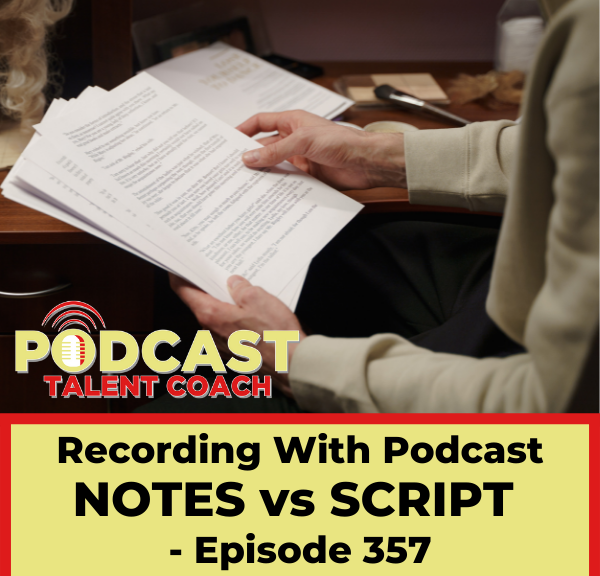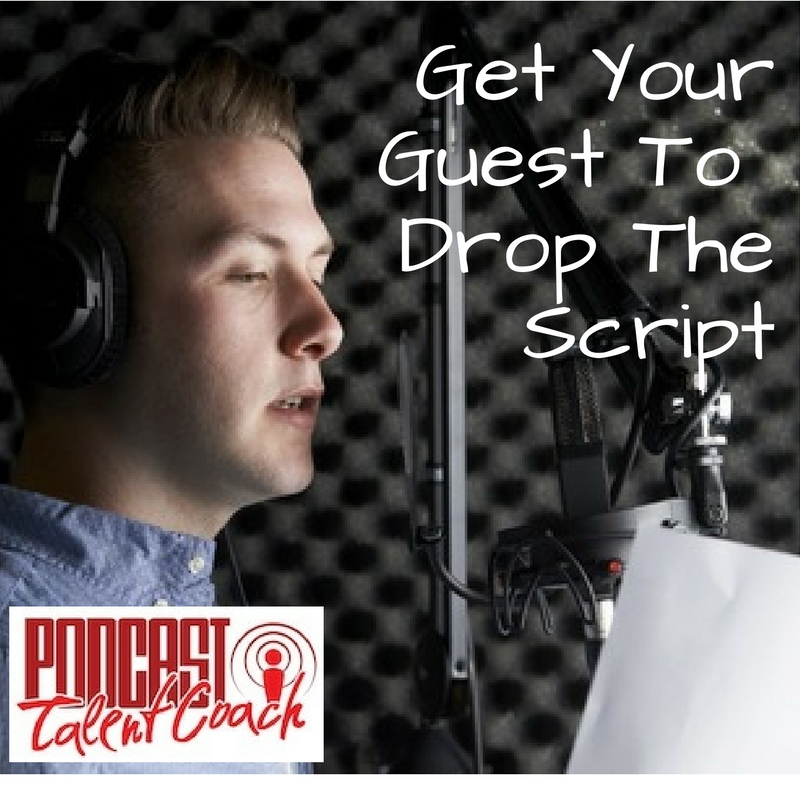Podcast: Play in new window | Download
Subscribe: RSS
This week I received a great email from a listener regarding your show prep. How do you balance your time when it comes to podcast notes versus using a script to record your show?
There are benefits to both. Today, I want to show you how to prepare with respect to where you are on your podcast journey.
LET’S CHAT
Before we get into it, I would love to invite you to have a free podcast strategy call with me. If you are struggling to grow your audience or monetize your show and you would like help building a strategy, take advantage of a free podcast strategy session with me.
You can apply for a spot at www.PodcastTalentCoach.com/apply.
Many people think these calls are just sales calls in disguise like many of the webinars you attend. The guru promises to teach you a ton. All you walk away with is a sales pitch.
This call is not that.
HOW IT WORKS
Here is how it works. You and I get on a Zoom call. We start by getting clear on your goals. Where do you want to be a year from now to happy with the results?
Then, we determine where you are now. With that, we have the path. Now we need to figure out how to travel that path.
We talk about what you’ve tried in the past. What has worked and what didn’t work? What did you enjoy and what frustrated you?
After we look at the past, we brainstorm the future. We kick around a few ideas to see what excites you. I have seem many things over my 3 decades in radio and podcasting. Ideas are my thing.
We then narrow down the ideas to one path that will work for you. This is an idea that excites you that I have seen work.
At this point, you have your strategy. If you would like my help implementing your strategy, we can talk about how that would look. On the other hand, if you don’t need the accountability, we leave the call as friends.
That’s it. No arm-twisting. Just two podcast fans talking ideas.
If you would like to build your strategy, you need to apply. I can’t possibly talk with everyone. Visit www.PodcastTalentCoach.com/apply.
THE QUESTION ABOUT A SCRIPT
The question this week comes from Taj. He writes …
Thanks for your podcasts. I benefit a lot from them.
One question I have is about scripting. How much do you script your podcast? Is it word for word or do you just have bullet points. You sound very engaging and deliver it as if having an engaging conversational chat with me (or other listeners).
Scripting word for word takes me a long time, but does mean I am tighter and get to the point quicker.
When I work off bullet points, I am able to speak and be natural and inject my personality, but I end up being more wordy. However, I need less time to prepare.
So how do you script or advise I script so I am natural but also not too wordy and take less time producing episodes.
Really appreciate your work.
Kind regards,
Taj
NOTES VS SCRIPT
Script vs. outline really depends where you are in your experience.
Being in radio for over 30 years, I’ve been able to hone my skills to be able to read a script and make it sound natural. It takes a lot of practice to do that.
Have you ever seen a play where the actors are just natural? The conversation feel authentic, even though they are reciting a script.
On the other hand, when we watch a high school performance or a production with rookie actors, the conversation is very stiff and unnatural. The words are pronounced with too much diction. There are no uhs or ums. Once speaker stops before the other speaker begins to talk.
The major difference between veteran and rookie actors is the way they approach the words on the paper. We speak much differently than we read and write.
A good actor can take a script and transform it into natural speech by adding in the little nuances that make it sound real.
When this happens, there are natural, vocal nuances that make it sound like speech rather than reciting text. There are breaths. The actor will start a sentence and then start over, just like you would in real life.
There are uhs and ums and half sentences. The actors aren’t perfect, because we aren’t perfect in everyday conversations.
If you script your show, you need to be a seasoned performer.
BEGINNERS
Beginning podcasters should begin using a detailed outline. This should not be scripted, but should include more detail than a general outline.
In this outline, include the big points you’d like to make. Build your standard outline as you would for any speech.
Then, go back to each point, and be sure to include details and stories that are important to the content. The more detail you can add, the less you will need to think in the moment.
If I were doing a detailed outline for this episode, I may include that sentence … The more detail you add, the less you need to think in the moment.
Details make your stories real and believable. If you are telling a story on your episode … and you should on every episode … put the details on the outline.
Day, time, setting, all 5 senses and names are all important details for any story. They should be on your outline.
When you script your episode as a beginner, it becomes difficult to sound natural. Without the experience, you sound like you’re reading it.
INTERMEDIATE
If you are a podcaster who has been doing the show for awhile, or you’ve been a public speaker who can be extemporaneous, you can work from an outline.
As with any public speaker, this takes time to develop as well.
When you’re working from a basic outline, the content should be information you know really, really well. I can speak without notes on the power of storytelling on a podcast, because I’ve been teaching it for decades.
If you are in that place with your content, you can probably work from a basic outline. You know the content. The outline is simply to keep you on track.
ADVANCED
If you’ve been doing your show for a long time, you can work from a script and be able to sound natural.
I typically write a blog post that I will use as my show notes. It is typically much shorter than it would be if my episode was transcribed.
As I record the episode, I use that blog post as my notes as I record. While recording, I make sure I don’t fall into reading the script. I use the post as a framework for my presentation.
When I first started using this method, I would highlight the key points as if it were an outline. I look at the blog post, find my next thought and then stop looking at it and just talk. This prevents me from reading text.
As I mentioned, the script needs to have the natural element of speech. Include the ums and uhs. Keep the half thoughts are restarts. That is what makes your show sound natural.
If you edit out every um and restart, you sanitize your show. Your episode is too clean and doesn’t sound natural. This is like a house in a movie that doesn’t look like anyone has ever lived in it.
It takes practice and takes time.
YOUR PODCAST SCRIPT
When it comes to your show, try various methods to see what works best for you. You might find that an outline that has much more detail works best for you. You might find that you can work from a script.
As you try the various methods, you will find that you try to move to the next and it feels uncomfortable. It is ok to revert back to the previous method.
Whichever method you use, it will take practice to perfect.
EFFICIENCY
Now, let’s talk about your time. There are benefits and drawback to each when it comes to show prep and show notes.
Creating an outline takes much less time than creating a script or blog post. On the other hand, a blog post is much more rich when it comes to search engines.
Your show notes do not need to be long text. Consider why your listeners would ever come to your show notes.
Listeners may visit your show notes for a website you mentioned or a link. They might want specific resources you talked about on the show.
Does any of that require a long blog post? Of course not. It requires an outline with some detail.
The blog post helps people find you when they are searching the internet. If that is important to you, create a blog post. Just keep in mind that most people discover a new podcast through word-of-mouth.
The outline method will help keep your prep time short and be more natural. The more detail will keep you focused and help you be a little less “wordy”.
As long as your presentation is engaging with personality, I don’t think people will think you are too wordy. Entertain and you’ll be fine.
Being aware of getting too wordy will naturally help you tighten it up.
Give the detailed outline a try and work from there.
If you don’t have a mentor who can take your hand and walk you every step of the way, go to www.PodcastTalentCoach.com/apply, click the button and apply to have a chat with me. We will develop your plan and see how I can help and support you to achieve your podcast goals.


